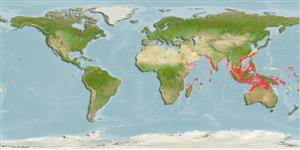Environment: milieu / climate zone / depth range / distribution range
Écologie
marin récifal; profondeur 20 - 200 m (Ref. 11441). Tropical; 30°N - 19°S
Indo-West Pacific: Persian Gulf to the western coast of India, eastward to the Pacific, where it occurs from Taiwan southward to the Arafura Sea (Ref. 9819) and northern Queensland, Australia (Ref. 3414).
Length at first maturity / Taille / Poids / Âge
Maturity: Lm 21.1 range ? - ? cm
Max length : 35.0 cm TL mâle / non sexé; (Ref. 11441); common length : 25.0 cm TL mâle / non sexé; (Ref. 3483)
Inhabits coral or rocky areas. Sometimes forms aggregations. Feeds on a wide variety of benthic animals. Smaller fish are mostly found inshore. Marketed mostly fresh, whole or dried-salted.
Life cycle and mating behavior
Maturities | Reproduction | Spawnings | Egg(s) | Fecundities | Larves
Starnes, W.C., 1988. Revision, phylogeny and biogeographic comments on the circumtropical marine percoid fish family Priacanthidae. Bull. Mar. Sci. 43(2):117-203. (Ref. 5403)
Statut dans la liste rouge de l'IUCN (Ref. 130435)
Menace pour l'homme
Harmless
Utilisations par l'homme
Pêcheries: intérêt commercial mineur
Outils
Articles particuliers
Télécharger en XML
Sources Internet
Estimates based on models
Preferred temperature (Ref.
123201): 21.9 - 28.3, mean 26.8 °C (based on 847 cells).
Phylogenetic diversity index (Ref.
82804): PD
50 = 0.5002 [Uniqueness, from 0.5 = low to 2.0 = high].
Bayesian length-weight: a=0.02138 (0.01571 - 0.02910), b=2.90 (2.82 - 2.98), in cm total length, based on LWR estimates for this species (Ref.
93245).
Niveau trophique (Ref.
69278): 3.8 ±0.3 se; based on diet studies.
Generation time: 1.6 (1.2 - 1.8) years. Estimated as median ln(3)/K based on 12
growth studies.
Résilience (Ref.
120179): Haut, temps minimum de doublement de population inférieur à 15 mois (K=0.6-1.23).
Fishing Vulnerability (Ref.
59153): Low vulnerability (23 of 100).
Nutrients (Ref.
124155): Calcium = 53.2 [33.9, 86.8] mg/100g; Iron = 0.65 [0.42, 1.03] mg/100g; Protein = 19.3 [18.3, 20.3] %; Omega3 = 0.176 [0.124, 0.251] g/100g; Selenium = 45.4 [28.3, 74.4] μg/100g; VitaminA = 61.3 [25.2, 151.0] μg/100g; Zinc = 1.08 [0.80, 1.46] mg/100g (wet weight);
